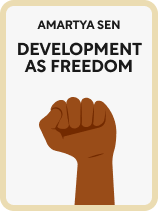

This article is an excerpt from the Shortform book guide to "Development as Freedom" by Amartya Sen. Shortform has the world's best summaries and analyses of books you should be reading.
Like this article? Sign up for a free trial here .
Are you looking for a Development as Freedom book review? How was the book received by critics and readers?
Amartya Sen’s Development as Freedom argues that freedom is the key to sustaining economic prosperity and the overall welfare of the world’s population. He outlines his own definition of poverty and development, which are both influenced by human rights.
Here’s a review and the background of Development as Freedom.
Development as Freedom Book Review, Impact, and Commentary
In Development as Freedom, Nobel Prize-winning economist Amartya Sen calls for a radical rethinking of the way we view poverty and economic development. Pulling from more than five decades of his own research, Sen argues that economic development goes beyond increasing wealth—it’s about expanding freedom.
About the Author
Amartya Sen is a professor of economics and philosophy at Harvard University. He was born in Santiniketan, India in 1933, and was a child when the Bengal Famine ravaged much of his homeland. Sen went on to earn his Ph.D. from the University of Cambridge in 1959, and he has taught in the United Kingdom at the London School of Economics and Oxford University, in addition to his native India. In 1998, Sen was awarded the Nobel Prize in Economic Sciences for his “contributions to welfare economics” including his work on poverty, famines, and social choice.
Sen has written or edited more than 20 books and 200 scholarly articles, primarily in philosophy and economics. Sen has also served as president of the Indian Economic Association, the American Economic Association, and the Econometric Society.
In addition to his Nobel Prize, Sen also received the National Humanities Medal, the Edinburgh Medal, and the George Marshall Award, among other accolades.
Connect with Amartya Sen:
The Book’s Publication and Context
Development as Freedom was published in 1999 by Alfred A. Knopf and Oxford University Press. It’s based on a series of five lectures Sen delivered to the World Bank in 1996.
Sen has devoted his career to the study of poverty. Development as Freedom reflects Sen’s interest in both economic philosophy and empirical research and combines moral and economic arguments.
Portions of Development as Freedom are a response to two of the 20th century’s most influential books on political philosophy: Robert Nozick’s Anarchy, State, and Utopia (1974), and John Rawls’ A Theory of Justice (1971).
Sen draws on portions of these and other works to articulate his “development as freedom” approach.
He also relies on his and his colleagues’ decades of empirical analysis of global poverty, famines, and women’s issues. He uses this evidence to show the practical importance of freedom to social progress.
To make his case that we should define development as expanding freedom, Sen draws heavily on Adam Smith’s early writings and The Wealth of Nations (1776). Sen invokes a wide range of scholars—from Karl Marx to F.A. Hayek—in his efforts to bridge typical ideological divides and establish his holistic approach to development as freedom.
The Book’s Impact
For a work of scholarship, Development as Freedom has been unusually influential. The Guardian called Sen a rare scholar to have “a major effect on politics” because he changed the way many policymakers look at poverty. For example, Sen helped the United Nations design the Human Development Index (HDI), a more comprehensive measure of welfare than standard per-capita income.
Sen has also ushered in an era of 21st-century economists who have focused on measures of social progress rather than simply economic growth.
In his native India, Sen is well-known and celebrated as “the Mother Teresa of economics.”
Development as Freedom Book Review
The majority of Development as Freedom book reviews were well-received, both by critics and the general public, and it’s often regarded as a more humane approach to economics. Kofi A. Annan, then the Secretary-General of the United Nations, said Sen had “revolutionized” the way economists approach development, calling him an insightful champion for the world’s poor.
Fellow Nobel Laureate Kenneth Arrow, whose work on social choice Sen criticizes in his book, was nonetheless positive, calling it “ a forceful and rigorous analysis” of the symbiotic relationship between freedom and development.
The World Bank even integrated much of Sen’s view of poverty as “capability deprivation” into its own definition.
However, there also have been criticisms from across the ideological spectrum. Some progressives think Sen emphasized individualism too strongly, at the expense of collective interests. They also think Sen overlooked the destabilizing effects of globalization and free trade on developing economies, and he neglected proper attention to the role colonialism has played in the problems of poor nations.
From a free-market perspective, some have criticized Sen’s support of a “positive rights” view of liberty, one that considers government entitlements as integral to human freedom.
The Economist, while praising the “great attractions” of the book, criticized Sen for ignoring the motivations of government action and the problem of rent-seeking—public officials pursuing their own interests above the public interest.
Commentary on the Book’s Approach
While Sen says in his introduction that Development as Freedom is geared toward a general audience, many parts of the book are esoteric. Some of the negative reviews of Development as Freedom include the fact that some of its ideas are a bit obscure. Readers who lack a basic background in economics and political philosophy will likely have trouble following some of the more abstract concepts Sen covers, such as utilitarianism and social choice theory.
Development as Freedom is part philosophy and part research. Sen relates many of his ideas back to various philosophers, Enlightenment thinkers, and early economists. Aristotle, Confucius, Montesquieu, Adam Smith, Mary Wollstonecraft, and Karl Marx all make appearances, among many others.
Sen supplements these philosophical discussions with the presentation of empirical research. In the chapters on famine and women’s agency, Sen cites much of his own research. Sen takes care to cite his sources, and there are approximately 50 pages of notes and references at the back of the book.
Commentary on the Book’s Organization
Development as Freedom consists of an introduction and 12 chapters. Another negative book review of Development as Freedom is that it often lacks a coherent organization because it’s not divided into parts.
Sen devotes the first few chapters to laying out the philosophical case for why economic development focused on income alone is insufficient, and why development as freedom offers a more useful alternative. In the latter half of the book, each chapter covers a more specific topic of development (chapters focus on democracy, famines, and women’s rights, for example).
Because of this structure, many sections overlap, with Sen reiterating the role of freedom as both the principal means and purpose of development in each chapter.
Helpfully, each chapter has a brief conclusion, covering the main points, and connecting them back to Sen’s thesis.

———End of Preview———
Like what you just read? Read the rest of the world's best book summary and analysis of Amartya Sen's "Development as Freedom" at Shortform .
Here's what you'll find in our full Development as Freedom summary :
- The five types of freedom that are integral to economic development
- How democracy can prevent famine
- How empowering women helps communities






